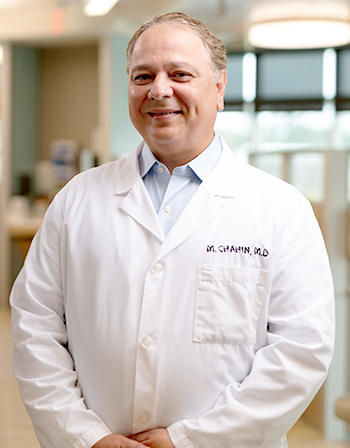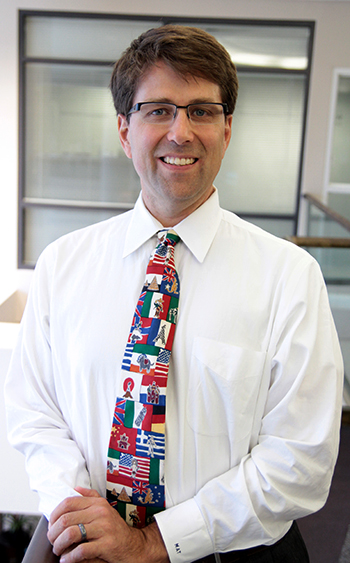Clinical Trials Close to Home, part 2: Debunking clinical trial misconceptions
Cancer
Two St. Joseph’s/Candler medical oncologists discuss five common concerns patients have about clinical trials
Over the years, we’ve seen a continuous increase in the cancer survival rate. One reason for better outcomes and longer years lived after diagnosis is improvements in treatment.
How are these improvements happening? You can thank clinical trial research and participation.
“We are always praising and discussing the latest and greatest treatments but don’t always discuss that those treatments are only available because we tested them through clinical trials and found their effectiveness before offering them as treatment,” says Dr. Majd Chahin, medical oncologist with St. Joseph’s/Candler and South Carolina Cancer Specialists.

About clinical trials
A clinical trial is a research study that involves patients and helps doctors and researchers find new ways to improve diagnosing, treating and preventing diseases, while also improving the quality of life for people with diseases. In clinical trials, researchers methodically test drugs, medical devices, screening approaches, behavioral modifications and other interventions.
Search our clinical trial database
Clinical trials are used to answer many different clinical questions, furthering screening and treatment options to help you stay healthy and get better sooner. By offering clinical trials at the Nancy N. and J.C. Lewis Cancer & Research Pavilion in Savannah, Bluffton and Hilton Head, you can get the latest treatment and help further cancer research in the comfort of your own community.
“Generally speaking, the point of clinical trials is to move the ball forward,” says Dr. Mark Taylor, medical oncologist with St. Joseph’s/Candler and Summit Cancer Care. “What we are doing today is not what we were doing yesterday, and the reason that’s different is because clinical trials have changed what we did yesterday to currently. Today’s clinical trials will define what we are doing tomorrow.”
Explaining common misconceptions

Some of our cancer patients don’t even realize we offer clinical trials at the LCRP. Others may have reservations about participating and don’t bring it up. Both Dr. Taylor and Dr. Chahin spend time explaining clinical trials to the patients that may qualify for an open study.
When explaining clinical trials, both oncologists address misconceptions and debunk any myths the patients may have heard. Here are five common misconceptions:
- I’m not actually being treated for my disease.
This couldn’t be further from the truth. Every patient receives the standard of care for their specific cancer diagnosis, says Dr. Chahin. Some clinical trials are randomized, which means you may get additional treatment, such as taking an extra chemotherapy drug, or you may get a placebo. Regardless, every patient gets the standard of care, clinical trial or not. And remember, that standard of care came to be because of clinical trials.
- I feel like a guinea pig being experimented on.
While Dr. Taylor doesn’t care for the term guinea pig, he understands the concept. But, he also reassures patients no one is a guinea pig and no one is being experimented on. He points out that you are participating in a study along with many others across the country and sometimes the globe to make improvements in treatments.
- I heard clinical trials aren’t safe.
You can be assured patient safety is always a top priority. All trials are administered according to protocol and are closely regulated. At St. Joseph’s/Candler, we only offer phase 2 and phase 3 clinical trials, so our trials have been tried and tested through phase 1 and wouldn’t be moving on if the data didn’t show promise.
At the LCRP, we have an entire research department dedicated to acquiring the best clinical trials for our population, making sure all laws and regulations are followed and then making sure our clinical trial patients are getting the best care. You are basically getting an extra team, an extra set of eyes throughout your treatment.
“There’s an extra team locally, regionally and nationally basically watching over our clinical trial patients,” Dr. Chahin says. “You are going to get that extra management for curing your condition and the extra eyes to assure your safety. There’s never really a loss when you enroll in a clinical trial. There’s only a gain to be had.”
- I don’t want to have extra expenses.
One barrier Dr. Taylor sees is patients are worried insurance won’t pay for clinical trials. The majority of the time that’s not a problem, he says. It’s even in the Affordable Health Care Act that clinical trials be covered by insurance.
If you participate in a clinical trial that requires more frequent lab work or imaging, oftentimes the research company behind the study will help cover any extra expenses.
Speaking of expensive, Dr. Taylor has had patients willing to fly half way across the country to hospitals with a particular clinical trial when it’s offered right here close to home. That saves money and is less stressful for patients when they choose a clinical trial at the LCRP.
“I encourage patients, if your doctor doesn’t bring up clinical trials, ask,” Dr. Taylor says. “We can see if there’s one that fits them. Be proactive and ask about it, if it doesn’t come up already.”
- I don’t want the extra work that comes with being on a clinical trial.
Any additional requests that may come with being on a clinical trial are minimal. In fact, many can be beneficial. You may be asked to fill out health questionnaires. This can help your health care team address any possible side effects or quality of life issues you may be facing. Some clinical trials may require more frequent blood work or imaging. That’s just more times we are confirming your treatment is working.
Both Dr. Chahin and Dr. Taylor have seen many home runs when it comes to clinical trials that we’ve participated in at the LCRP. They’ve also witnessed many patient success stories. (Dr. Chahin has been practicing in Beaufort County since 1995, and Dr. Taylor in Savannah since 2002.)
“We don’t have a treatment today that I do every day, multiple times a day and talk to people about that has not gone through clinical trial,” Dr. Chahin says. “It’s evidence-based medicine, and that evidence comes from clinical trials. When we treat people five years from now, 10 years from now, it’s because of the clinical trials we are doing today. That’s why it’s very important to enroll people in these trials.”
Also in this series: